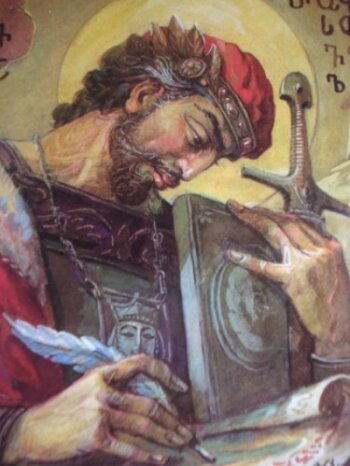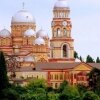 Ancient collections become part of world heritage
Ancient collections become part of world heritageGeorgians highly appreciate ‘The Man in Panther’s Skin”, written by Shota Rustaveli back in the 12th century at the Royal court of Queen Tamar. On July 15, 2013, journalists learned that UNESCO has enlisted its ancient collection in the list of documentary heritage.
Out of 96 manuscripts, 94 are preserved at the National Center of Manuscripts in Georgia and 2 of them are kept at Bodleian Library in Oxford, Great Britain.
Buba Kudava, Director of the National Center of Manuscripts remarked: “This is a very important fact in the history of our cultural heritage. It is a great privilege for our center, and the fact that 2 collections out of 96 are kept in Great Britain, in the collection of the Wardropes is significant. From now on, the manuscripts of “The Man in Panther’s Skin” are added to te list of the documents that are named ‘the world heritage’.
Davit Zurabishvili, Deputy Minister of Education and Science of Georgia attended the press conference. “Manuscripts that have created a history – such is a brief description of the list where our great book’s collections have been included. Hence, it will occupy its honorary place together with other internationally distinguished documents. I believe that this is not a mere success of the National Center, which did a great job, but rather the success of the Georgian culture as a whole.”
Shota Rustaveli’s “The Man in Panther’s Skin” has been translated into many foreign languages; it is considered to be an identity card of Georgian. Even for the diplomats who are appointed to come and work here, it is a “must” to get acquainted with this splendid piece of Georgian literature, which is considered to be one of the avant-garde books and predecessors of the Renaissance. Wise aphorisms and refined poetic manner touch all its readers – it gives answers to many questions. It is like a chest of wisdom, beauty, kindness and love – everything that is blessed by God. And first and foremost, it is an Ode to Our God. It is a masterpiece of belles-lettres. It is a paradox that we don’t even know the place of its author’s grave. We have scarce information about his personality as well. All we know is that he came from Meskheti and he was in unrequited love with Queen Tamar.
eorgians highly appreciate ‘The Man in Panther’s Skin”, written by Shota Rustaveli back in the 12th century at the Royal court of Queen Tamar. On July 15, 2013, journalists learned that UNESCO has enlisted its ancient collection in the list of documentary heritage.
Out of 96 manuscripts, 94 are preserved at the National Center of Manuscripts in Georgia and 2 of them are kept at Bodleian Library in Oxford, Great Britain.
Buba Kudava, Director of the National Center of Manuscripts remarked: “This is a very important fact in the history of our cultural heritage. It is a great privilege for our center, and the fact that 2 collections out of 96 are kept in Great Britain, in the collection of the Wardropes is significant. From now on, the manuscripts of “The Man in Panther’s Skin” are added to te list of the documents that are named ‘the world heritage’.
Davit Zurabishvili, Deputy Minister of Education and Science of Georgia attended the press conference. “Manuscripts that have created a history – such is a brief description of the list where our great book’s collections have been included. Hence, it will occupy its honorary place together with other internationally distinguished documents. I believe that this is not a mere success of the National Center, which did a great job, but rather the success of the Georgian culture as a whole.”
Shota Rustaveli’s “The Man in Panther’s Skin” has been translated into many foreign languages; it is considered to be an identity card of Georgian. Even for the diplomats who are appointed to come and work here, it is a “must” to get acquainted with this splendid piece of Georgian literature, which is considered to be one of the avant-garde books and predecessors of the Renaissance. Wise aphorisms and refined poetic manner touch all its readers – it gives answers to many questions. It is like a chest of wisdom, beauty, kindness and love – everything that is blessed by God. And first and foremost, it is an Ode to Our God. It is a masterpiece of belles-lettres. It is a paradox that we don’t even know the place of its author’s grave. We have scarce information about his personality as well. All we know is that he came from Meskheti and he was in unrequited love with Queen Tamar.




















































